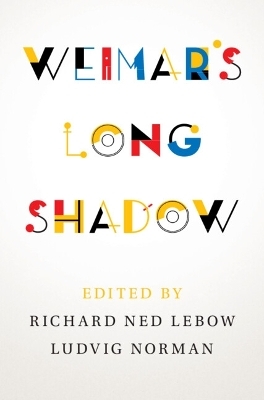
Weimar's Long Shadow
Cambridge University Press (Verlag)
978-1-009-48434-3 (ISBN)
Weimar casts a long shadow over post-war political thought. The Weimar Republic is used to understand contemporary threats to democracy and to critique or defend modernity. It has generated a series of political lessons that are invoked whenever democracies are challenged. This book questions the historical validity of most of these lessons and their applicability to contemporary political orders. It shows how Weimar lessons are often influenced by partial and superficial readings of events, often intended to advance particular political projects. The chapters give detailed accounts of how so-called Weimar lessons have influenced, if not shaped, political debates in Germany, elsewhere in Europe, and the United States.
Richard Ned Lebow is Professor of International Political Theory, Emeritus at King's College London; Honorary Fellow of Pembroke College at the University of Cambridge and James O. Freedman Presidential Professor, Emeritus at Dartmouth College. Among his most recent books are The Quest for Knowledge in International Relations (Cambridge, 2022) and, co-edited with Ludvig Norman, Robustness and Fragility of Political Orders (Cambridge, 2022). He is a Fellow of the British Academy and the recipient of numerous book awards. Ludvig Norman is Associate Professor of Political Science at Stockholm University and Senior Fellow in the Institute of European Studies at the University of California, Berkeley. His most recent works include Dilemmas of European Democracy, co-edited with Niklas Bremberg (2023), Robustness and Fragility of Political Orders, co-edited with Richard Ned Lebow (Cambridge University Press, 2022), as well as many articles in journals including Democratization, European Journal of International Relations, Journal of Common Market Studies and Political Studies.
1. Why Weimar? Richard Ned Lebow and Ludvig Norman; 2. An unheroic but understandable failure: German social democrats and the collapse of the Weimar Republic Douglas Webber; 3. Bonn's Weimar Peter C. Caldwell; 4. The paradigmatic example of Weimar and postwar political science: the case of Otto Kirchheimer Peter Breiner; 5. Swedish social democracy and Weimar: engineering the democratic population with the Myrdals Ludvig Norman; 6. Our past, Weimar's present: democracy's defense and the inversion of an historical lesson Amel Ahmed; 7. Weimar on the Potomac? Leo Strauss goes to Washington William E. Scheuerman; 8. Shadows of Babylon and shreds of artificial silk: cultural and political legacies in the contemporary television series 'Babylon Berlin' Jill Suzanne Smith; 9. Militant democracy: a (supposed) Weimar lesson revisited Jan-Werner Müller; 10. Weimar and modernity Richard Ned Lebow and Ludvig Norman.
| Erscheinungsdatum | 01.08.2024 |
|---|---|
| Zusatzinfo | Worked examples or Exercises |
| Verlagsort | Cambridge |
| Sprache | englisch |
| Maße | 152 x 229 mm |
| Gewicht | 576 g |
| Themenwelt | Sozialwissenschaften ► Politik / Verwaltung ► Europäische / Internationale Politik |
| Sozialwissenschaften ► Soziologie | |
| ISBN-10 | 1-009-48434-6 / 1009484346 |
| ISBN-13 | 978-1-009-48434-3 / 9781009484343 |
| Zustand | Neuware |
| Informationen gemäß Produktsicherheitsverordnung (GPSR) | |
| Haben Sie eine Frage zum Produkt? |
aus dem Bereich


